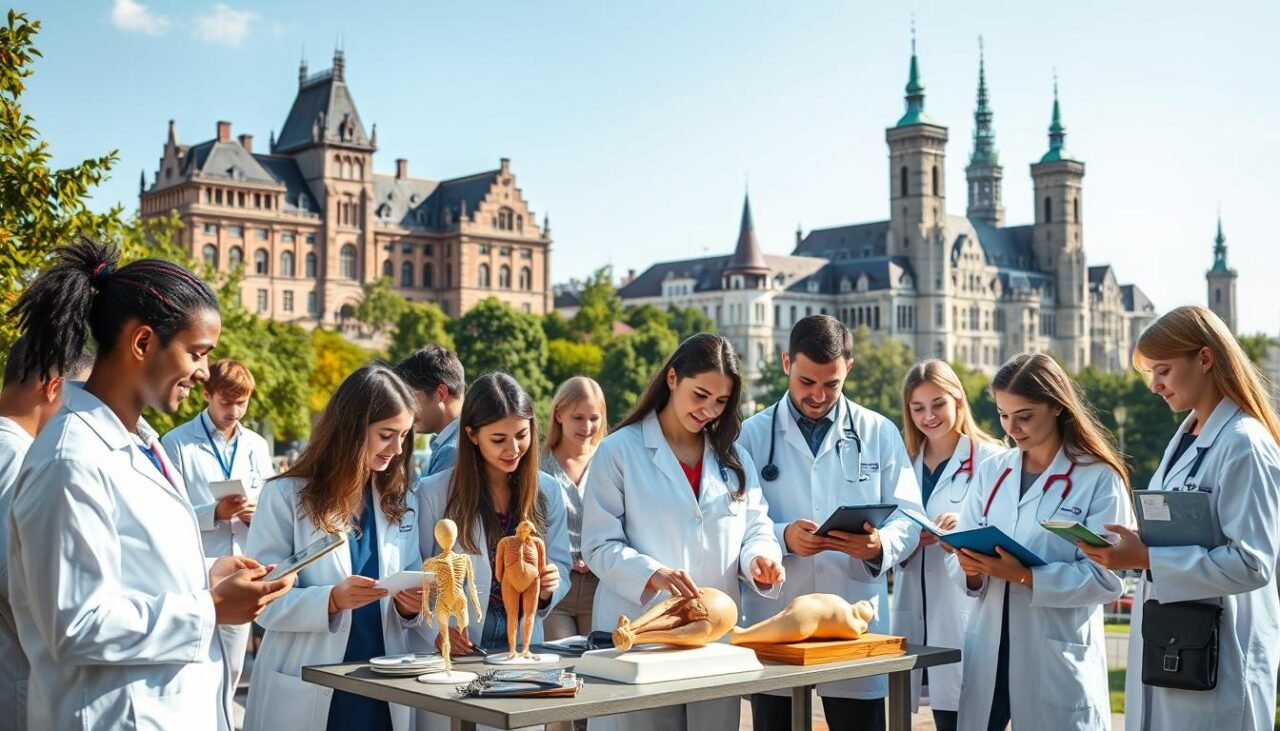🇩🇪 Introduction: Why Germany Is a Global Leader in Medical Education
Germany is internationally recognized for its high standards of medical education, state-of-the-art hospitals, world-class universities, and a healthcare system that’s among the best globally. For MBBS graduates who are looking to pursue Master’s-level medical studies, Germany offers a highly attractive destination — both academically and professionally.
Whether you’re looking to specialize in a clinical field, pursue medical research, or prepare for a medical license to practice in Germany, the country offers affordable, high-quality, and future-proof options for international doctors.
👨⚕️ What Is Meant by “MBBS Master’s Studies” in Germany?
In Germany, medical education follows a slightly different system compared to countries like India, Pakistan, or Nepal. Instead of “MBBS + MD” as seen in South Asia, Germany follows:
- 6-year integrated medical degree (equivalent to MBBS + parts of PG)
- Followed by Facharztweiterbildung (specialist training), equivalent to a Master’s/Residency
So, for international MBBS graduates, Master’s Studies may include:
- Medical PG specialization (Facharzt)
- Master’s in Public Health (MPH), Health Management, or Clinical Research
- Medical licensing pathway (Approbation) + specialty training
- Advanced Biomedical Sciences / Medical Informatics / Neuroscience, etc.

🎓 1. Globally Respected Medical System and Training
Germany’s medical education system is ranked among the best in the world. Studying or training here means you’re part of a system known for:
- Evidence-based, patient-centered education
- Training in university hospitals with advanced facilities
- Curriculum taught by highly qualified professors and clinicians
- Emphasis on clinical exposure and research
- Free or low-cost education, even for international students
Germany is a pioneer in medical innovation, technology, and surgical techniques.
💰 2. No or Low Tuition Fees
One of the biggest advantages of studying in Germany is that most public universities charge no tuition fees, even for international students.
For Master’s degrees like:
- MPH (Master of Public Health)
- M.Sc. in Molecular Medicine / Biomedical Sciences
- M.Sc. in Neuroscience / Translational Medicine
Tuition is either free or very affordable, typically between €0–€3,000 per year, with a semester fee covering administrative costs and public transportation.
This makes Germany one of the most cost-effective countries for medical postgraduate studies.
🧪 3. Research Opportunities in Advanced Medical Fields
Germany is home to some of the world’s leading research institutions, such as:
- Max Planck Institutes
- German Cancer Research Center (DKFZ)
- Helmholtz Association
- Charité – Universitätsmedizin Berlin
- LMU Munich Medical School
- Heidelberg University
Students pursuing Master’s in medical research fields like:
- Molecular Biology
- Immunology
- Neuroscience
- Oncology
- Epidemiology
will have access to world-class laboratories, professors, and funding opportunities.
🩺 4. Pathway to Specialization (Facharzt) for MBBS Graduates
For MBBS graduates who want to become specialists (e.g., Cardiologist, Radiologist, Surgeon) in Germany, the process includes:
- Getting your medical degree recognized (Approbation process)
- Proving B2 level German proficiency
- Passing the FSP (Fachsprachprüfung) – Medical German language exam
- Starting your Facharztweiterbildung (5-6 years depending on specialty)
This training is fully paid, with monthly salaries between €4,500–€6,000, and leads to a specialist title equivalent to MD/MS/DNB.
You learn and earn at the same time.
🧑⚕️ 5. Massive Demand for International Doctors in Germany
Due to an aging population and shortage of healthcare workers, Germany is actively welcoming foreign-trained doctors.
- Over 32,000 international doctors are already working in Germany
- Most are from India, Egypt, Syria, Ukraine, and Pakistan
- Fields in high demand include:
- Internal Medicine
- General Practice
- Psychiatry
- Surgery
- Anesthesiology
- Radiology
- Geriatrics
This demand ensures long-term job security, attractive salaries, and PR opportunities.
🌍 6. International Master’s Programs in English
While medical specialization (Facharzt) requires German fluency, many Master’s programs are offered in English, such as:
- M.Sc. Molecular Medicine – University of Göttingen
- M.Sc. Biomedical Computing – TU Munich
- M.Sc. Neuroscience – University of Freiburg
- Master of Public Health (MPH) – Bielefeld University, Heidelberg University
- Health and Society in South Asia – University of Heidelberg
- M.Sc. Epidemiology – LMU Munich
These programs are ideal for MBBS graduates aiming for research, public health, or global healthcare leadership roles.
📈 7. Competitive Salaries & Career Growth
After completing medical PG or a Master’s in Germany, career opportunities open up in:
- Hospitals and Clinics
- Research Centers
- Public Health Departments
- Pharmaceutical and Biotech Companies
- Health Policy & NGOs
Average salaries:
- Resident Doctor: €50,000–€70,000/year
- Specialist Doctor (Facharzt): €80,000–€120,000/year
- Public Health Consultant / Researcher: €50,000–€80,000/year
With experience, salaries and positions increase significantly.
🗺️ 8. European Mobility & Global Recognition
Germany is part of the European Higher Education Area (EHEA), which means your medical Master’s degree is recognized across the EU and beyond.
You can:
- Apply for medical jobs across France, Netherlands, Sweden, Austria, etc.
- Work with WHO, UN, EU Health Agencies
- Pursue a PhD or further specialization globally
It gives you flexibility, credibility, and career mobility.
🏡 9. Pathway to PR & Citizenship
Germany supports skilled international professionals in settling long-term.
After your studies:
- Get an 18-month post-study work visa
- Apply for a residency permit with a job offer
- Apply for Permanent Residency (PR) in as little as 21–33 months
- You can later apply for German citizenship after 5–8 years
Your family can also join you, and your children can study free of cost in German schools and universities.

🤝 How Welcare Overseas Education Consultants Help You
Navigating medical PG options in Germany can be complex. That’s where Welcare Overseas Education Consultants step in.
We provide:
✅ Complete admission support for Master’s programs
✅ Step-by-step Approbation process for MBBS graduates
✅ APS certificate guidance (for Indian students)
✅ Visa filing & interview preparation
✅ German language training (A1 to B2)
✅ Pre-departure support, accommodation & more
With years of expertise and 1000+ success stories, we help doctors and MBBS graduates build strong careers in Germany.
✅ Conclusion: Why Germany Is the Best Choice for MBBS Master’s Studies
If you’re an MBBS graduate looking to:
- Specialize in a clinical field (Facharzt)
- Pursue a Master’s in Public Health, Biomedical Sciences, or Clinical Research
- Work in one of the world’s best healthcare systems
- Earn a high salary and settle in Europe
Then Germany is the perfect destination for you.
It offers affordable education, world-class training, career growth, and a bright future — all in one place.
